Loren C. Steffy's Blog, page 3
September 24, 2021
Three days at Camp David and a year in Cyprus
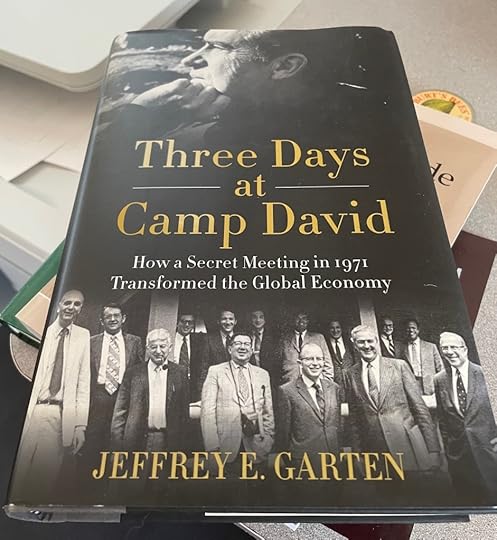
Jeffrey Garten’s new book, Three Days at Camp David,has worked its way to the top of my reading pile. Why would I want to spend some 300 pages studying a change in monetary policy from 50 years ago?
Well, I’m a bit of a money nerd, having covered business for more than 30 years, including a decade or so covering regional Federal Reserve banks. But the main reason is more personal. The Camp David meetings in 1971 led to President Nixon’s decision to sever the dollar from the gold supply. The effects of that decision hit home for my family a year later and half a world away.
In 1972, we had moved to the Mediterranean island nation of Cyprus, where my father was reassembling the sunken fragments of a 2,300-year-old Greek merchant ship in the coastal hamlet of Kyrenia.
My book, The Man Who Thought Like a Ship,tells the story of how my dad, a small-town electrician at the time, found himself in a position of rebuilding an ancient ship on the other side of the world, but the point is that then, as now, nautical archaeology doesn’t happen without funding.
My parents were counting on a UNESCO grant to pay our living expenses for a year. The grant not only paid my father’s salary, it also had an expense account that enabled him to buy tools and equipment.
The decision to decouple the dollar from the gold standard caused the dollar’s value to fall, and the decline accelerated as the Watergate scandal unfolded. UNESCO paid its grantees in U.S. dollars, but the Cypriot pound was tied to the British pound in those days. At first, my parents just faced the concern that the money wouldn’t go as far. Then, UNESCO began cutting back on grantees, starting with the newest ones. My dad was near the top of the list.
He was chasing a dream, but he was also practical. He told Michael Katzev, the director of the Kyrenia Ship Project, that without the grant, he’d have to return to the U.S. and resume his electrician’s job. He support a family on no income.
It was the first time I remembered my parents being openly worried about money. They rarely discussed their finances, and in fact, I had no idea what my parents made or how grave the situation in Cyprus was until I started writing my book. But I remember my mother telling me we might be leaving early, and I knew my dad would never leave the Kyrenia Ship unfinished unless the situation was dire.
When you’re a child, seeing your parents in distress leaves an impression. So I wanted to understand more about this monetary policy decision that wound up having such an impact on my family.
Our personal crisis itself was averted. Katzev told my father he would figure something out, and he did. “Michael somehow scraped some funding together to keep me on; I have always suspected it was his own money,” my dad wrote years later.
The financial struggles would continue for the next few years, and my dad did, in fact, go without an income for a few years until he joined the faculty of Texas A&M University in 1976.
The Camp David meetings may have “transformed the global economy,” as Garten’s subtitle says, but it almost undermined the transformation of my father’s career and derailed his dreams.
In a subtle way, it also influenced my approach to business writing. I’ve always gravitated toward stories about the unintended consequences of money, and as a columnist at the Houston Chronicle, I frequently wrote about how esoteric monetary issues affected ordinary people, often in ways they hadn’t thought about. So I’d like to better understand one of the most important money policy decisions of my lifetime, and I’ll be interested to read Garten’s perspective.
September 8, 2021
A random encounter with a grumpy cowboy
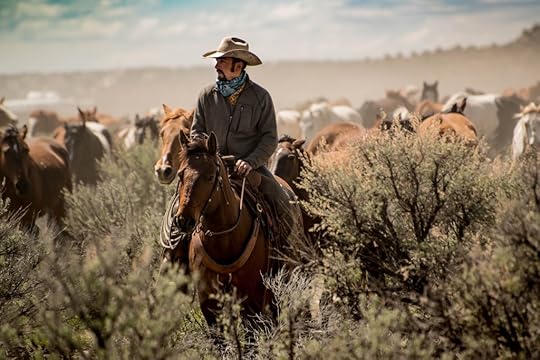
On the second day of our Colorado vacation, I met a grumpy cowboy.
As we came down the road from Cottonwood Pass, between Buena Vista and the Taylor Reservoir, my wife suggested that we take the back way, turning north and looping around past Spring Creek — the first place we camped in Colorado some 30 years ago.
Soon after the paved road turned to dirt, traffic was stopped by a small cattle drive. The herd was being driven by one cowboy and one cowgirl on horseback, another man in an all-terrain vehicle, and two cow dogs. We watched them work. The dogs, in particular, were incredible. As soon as they spotted a straggler, they would spring into action, nipping at the heels of the wayward cows and bringing them back to the group.
Because of the hills on one side of the road and a creek on the other, the cowhands had to drive the herd up the road, toward the waiting traffic. As they moved forward, the cars behind them, where we were, began inching up. At one point, the camper in front us pulled forward, basically splitting the herd. Suddenly, we found ourselves with cows on both sides of us, and the dogs and cowhands frantically trying to collect the stragglers amid the cars.
I could hear the lead cowboy cussing as he road toward us. It was a warm sunny day, and his felt hat was soaked through with sweat.
Unsure what to do, I started to inch forward, thinking it would allow them better access to the separated cows. Then, one of the dogs ran close to our Jeep, and I stopped. The cowboy turned toward me. I nodded.
He wasn’t pleased. He pointed at me and said, “That dog is worth more than your life.”
I told him I was watching the dog. After all, that’s why I stopped. It wasn’t a situation that lent itself to a lot of explanation, but I felt bad to be adding to his obvious frustration.
I had to think that if they had more help, they might have been able to manage the traffic as well as the cows, or at least communicated with the motorists. But, of course, the economics of ranching don’t allow for an abundance of labor. Ranches, like many other businesses, are shorthanded these days, and the day rates they pay cowhands has been declining for decades.
I could sympathize with the difficulty of moving cattle down a public road in an area that attracts tourists, including dirt bikes and loud off-road vehicles that can spook the cows. But mostly, I found myself replaying the scene from The Big Empty in which Blaine Witherspoon gets too close to Trace Malloy’s cutting horse. Witherspoon is imagining himself adjusting to his new surrounding, resting his foot on the corral fence. Just as he begins to feel confident, Malloy’s voice cut into his thoughts.
“Son, you’re in about the worst place you could possibly be.”
When the cows were finally clear of the road, I drove on, feeling rather Witherspoon-ish for a few miles. But something else bothered me. Writing a book means making thousands of little decisions, and often, you find yourself surprised at something you overlooked. Now, as we wound along the dirt mountain road, I thought: I should have given Malloy a dog.
September 2, 2021
Why name a ranch ‘Conquistador?’
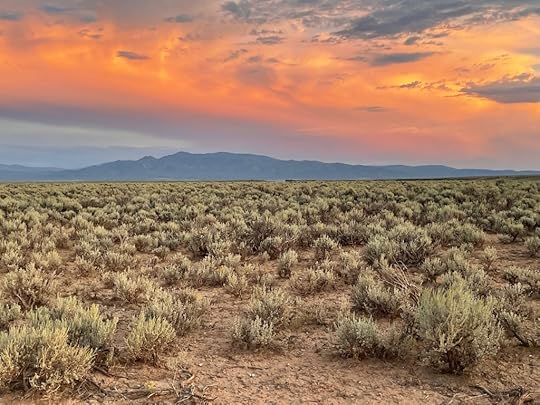 The Big Empty, New Mexico version: sunset outside Taos (photo: Laura Steffy)
The Big Empty, New Mexico version: sunset outside Taos (photo: Laura Steffy)I recently wrapped up a vacation in Colorado and New Mexico by spending a few days in Taos. For most of my trip, I’d been wearing one of the Conquistador Ranch hats that I’d had made for The Big Empty.
When I got to Taos, I found myself rethinking my choice of headgear.
The region is home to eight Native American pueblos, including the Taos Pueblo, which has been inhabited continuously for 1,000 years. In the late 1500s, the conquistadors, sanctioned by the King of Spain, moved into the area and, true to their name, conquered the pueblo people, leading to 100 years of conflict. As part of the process, the Spanish forced the native peoples to convert to Christianity and introduced diseases such as small pox.
Given that history, and assuming that many New Mexicans weren’t familiar with The Big Empty—at least not yet—I decided perhaps wearing a Conquistador Ranch hat wouldn’t be respectful to the place I was in.
I also thought about a few critical comments I’ve received on social media about the choice of the name.
Why did I pick a controversial moniker for my fictional ranch in the first place? Well, I wanted something that captured, if you will, the vast history of the land and of Texas. And I thought the name accentuated the conflict between the past and the present that was a theme of the book.
At one point, I had a scene in which Blaine Witherspoon criticized the ranch’s name and suggested it be changed because of the repressive history of the conquistadors.
I wound up cutting that scene, purely for reasons related to the overall structure of the story itself. Witherspoon was already enough of a jerk. Indeed, much of the rewriting in recent years had focused on making him more sympathetic. So in an effort to soften his character, I decided to limit his indignations to the issues that tied directly into the plot.
The other reason for the cut was pacing. The scene occurred when Witherspoon was visiting the ranch during the roundup, and I felt that it distracted from the other events of that chapter.
But in light of my time in Taos, where the impact of the Spanish conquest remains important social context, I found myself thinking about that scene. So I dug it out of an early draft, and here it is:
Witherspoon looked around and took a deep breath. Despite the desolation of the place, and the mounting heat of the late-morning sun, he couldn’t deny there was a beauty to it.
“It’s sure is amazing out here,” he said to Malloy, trying to play on the cowboy’s sympathies.
“It grows on you,” Malloy said.
“It’s too bad the name detracts from the beauty,” Witherspoon said, before he could stop himself.
“The name?”
Witherspoon winced. He’d only been in Malloy’s presence for a few minutes and he was already stirring up conflict. But he couldn’t stop himself. How could the cowboy be so obtuse as to go to work each day in a place whose very name represented what amounted to genocide?
“Conquistador,” he said. “They, uh, weren’t very nice people. They conquered, they basically enslaved people in their quest for gold, they brought disease, they suppressed native religions and forced the indigenous peoples to convert to Christianity. Thousands died. Entire culture were nearly wiped out. Not exactly a heroic namesake.”
Malloy stared at him for a minute. It was bad enough he had to conduct this little slicker show, now he had to defend the name of the ranch itself?. He bit his lip.
“I didn’t name it,” he said flatly.
“I understand, but it seems like the owners of the ranch might want to change the name.”
“Change the name?” Malloy said incredulously. “Do you know what that would cost? The name is known all over the West. The brand is recognized. It’s been the name for over a hundred years. You can’t just change it because someone shows up from Silly-cone Valley and decides they don’t like it.”
“I guess it just depends what you want your name to represent.”
“It represents all this,” Malloy said, waving his hand across the expanse of the land. He took a deep breath, and added. “It was named by a bunch of Scotsmen a hundred years ago. You’d have to take it up with them.”
Besides, he thought to himself, how much longer would the brand endure? What would be the point of changing it now?
August 24, 2021
What would Boone say about the Big 12 breakup?

T. Boone Pickens, who grew up in Holdenville, used to reminisce childhood trips with his father to Norman to watch University of Oklahoma football games. He even remembered discussions with his father decades ago when the University of Nebraska considered leaving the Big Six for the Big Ten and what it would mean for his favorite teams.
So I found myself wondering what Pickens would make of the decision by OU and the University of Texas to leave the Big 12 for the Southeastern Conference. The move could put his alma mater — Oklahoma State, where he’s the biggest donor and where his name adorns the football stadium — in dire straits.
While school loyalty would definitely play into his feelings, I think if Pickens were alive today, he’d have other reasons for wanting to keep the Big 12 together. During the last realignment, in 2011, he thought it was a mistake for Texas A&M, which he attended his freshman year, to leave for the SEC.
“They’re moving out of Texas when they do that,” he said. “I don’t think that’s a smart deal.”
Today, many Aggies may not agree given their recruiting success in recent years under SEC mega-coach Jimbo Fisher. In fact, A&M has probably benefitted from being the only Texas school in the SEC, which means it isn’t thrilled about its old rivals from Austin diluting its big draw for the state’s most promising young athletes.
But back in 2011, before the Aggies made their decision, Pickens bemoaned the conference realignment, which at the time included speculation that many Big 12 schools, including OSU, would hightail it to the PAC 10.
“I don’t want the Big 12 to break up,” he said at the time. “I don’t want to go to the Pac 10.”
He explained his reasoning in football terms: joining the Pac 10 meant being relegated to the less-prestigious Eastern Division, and it would be harder to rise to prominence against the dominant Western Division teams.
But I think there was a deeper reason: pride of place. Pickens loved Oklahoma, and he loved the idea of teams from the heartland playing each other. The Big 12 elevated the prominence of those heartland schools and gave them a unique showcase.
Just as many Texans still believe A&M and UT should be in the same conference, Pickens felt strongly that OU and OSU should stay together. An increasingly misnamed Big 12 just isn’t the same.
“There’s too much tradition just to wash it out and we scatter,” he said. “I think OU and Oklahoma State will stick together if something happens. We’re kind of a stick-together crowd in this state.”
Not anymore. OU is headed for the Big Money, leaving a shattered Big 12 in its wake. OSU is left to either once again try for the Pac 10 or try to keep some sort of conference together with Big 12 flotsam like Texas Tech and Baylor.
If Pickens were alive, he probably would have been working behind the scenes long before anything was announced. He might have reminded UT that he gave $100 million to two of its medical schools in 2007.
As a businessman, Pickens might have understood UT and OU’s financial reasons for leaving, but even an erstwhile corporate raider knows some things are more important than money.
As my co-author, Chrysta Castañeda, pointed out, Pickens believed in loyalty. She saw that first hand representing him during the court case at the center of our book, The Last Trial of T. Boone Pickens. He would have wanted the Big 12 schools to honor their commitment to each other, and honor their fans by keeping regional teams together.
As an Aggie myself, I believe A&M made the right move in leaving for the SEC a decade ago, and I take some satisfaction in seeing UT, after a decade of jealous criticism, finally admitting the Aggies made the smart move all along. But playing in the SEC isn’t the same. Sure, it’s great to beat Alabama on their own turf, but it doesn’t have the satisfaction of trouncing the Longhorns in Austin.
School rivalries are the bedrock of college sports, and they exist because of proximity. Who cares if you beat some school three states away? It’s more fun to beat the guys just down the highway.
OU may benefit from joining the SEC, just as A&M did, but it’s losing something, too. For all his influence, Pickens probably couldn’t have stopped the breakup of the Big 12. But he would have reminded everyone that pride of place still has value.
His friends referred to his favorite expressions as “Booneisms,” and one of them applies to the Big 12 split:
“If you want to make a deal badly enough, you’ll make a bad deal.”
Perhaps in the modern world of college sports, value is measured only in dollar signs. Perhaps the quaint notions of state rivalries and hometown football games no longer matter. And perhaps it’s ironic to invoke the memory of a billionaire to argue that money isn’t everything.
But if Pickens were alive, he would see the greater value is in what’s being lost — not just for OSU, but for everyone in the Big 12.
August 20, 2021
‘Deconstructed:’ Coming soon in paperback
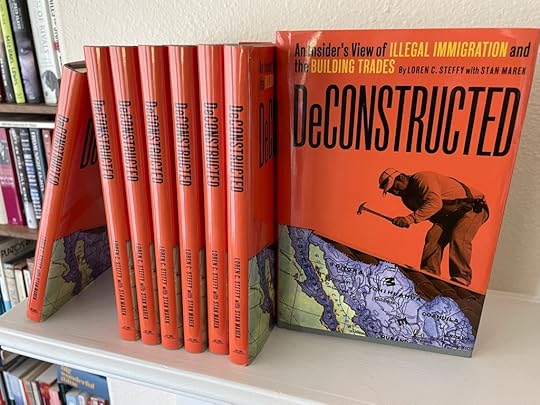
When Joe Biden won the presidential election, about a month after the release of Deconstructed: An Insider’s View of Illegal Immigration and the Building Trades, hopes ran high that long-awaited immigration reform legislation might finally arrive this year.
That, of course, hasn’t happened. In fact, the political divide remains as intractable as ever. Lawmakers seem determined to avoid solutions, regardless of public sentiment. Our elected officials insist on hiding behind a wall of denial when it comes to immigration issues.
My co-author, Stan Marek, a Houston business owner who’s has been fighting for reform for almost 20 years, has been increasingly concerned that the opportunity to bring rationality to our immigration policy could once again be slipping away.
That’s why we’ve decided to put out an updated version of Deconstructed next year. It will be a paperback release, but it will have new material that will bring the immigration story through the pandemic, the final days of the Trump administration, and the promise and pitfall of the Biden administration’s efforts.
Stan and I are already working on the new material, and I think you’ll find it’s a great update to the book. Look for it in bookstores and online in late spring 2022.
August 17, 2021
Pod people: Casting about for new ideas
Guest Host @SarahKSilverman talks about something that’s very important to her… pic.twitter.com/SDfJiPJqoj
— Jimmy Kimmel Live (@JimmyKimmelLive) August 13, 2021
Everyone, it seems, podcasting. Why should I be any different?
I co-host a weekly interview show about immigration issues at the Rational Middle. In fact, we’re closing in on our 100th episode.
I recently interviewed author Jessica Goudeau about her excellent book After the Last Border,which just came out in paperback.
My involvement with the Rational Middle stemmed from my book Deconstructed: An Insider’s View of Illegal Immigration and the Building Trades.The book and the first season of the video series were produced simultaneously. The podcast originally was designed to augment the videos and react more quickly to the news. When the pandemic hit and filing new video episodes became impossible, the podcast became our main focus. (We’re now ramping up the production schedule for new videos — but the podcast will continue. )
As the COVID-19 outbreak was gaining steam in the U.S., I was in discussions with a media partner about producing a six- to eight-episode podcast for the 10th anniversary of the Deepwater Horizon disaster. The podcast would have updated my book on the disaster from 2010, Drowning in Oil: BP and the Reckless Pursuit of Profit.(The book is out of print at the moment, but used copies are available online, and I released an updated audio version last year.)
The pandemic — and the corresponding plunge in oil prices — meant the podcast never got made. At least Sarah Silverman didn’t have to send the Pod Squad after me.
I’m always looking for new podcast ideas. What podcasts or audio storytelling would you like to see? Or, to Silverman’s point, has the format jumped the shark?
August 13, 2021
Heard any good books lately?

I’ve done audio versions of three of my books: Drowning in Oil, Deconstructed, and my biography of George P. Mitchell. I’ve been planning an audio version of my novel, The Big Empty, which I had hoped to record at the end of last year. Things got busy, and it hasn’t happened yet.
On the one hand, audio books are a popular new format, and they offer a chance to do a lot of unique things with story telling — things that I haven’t even begun to explore.
So, as I once again think about producing the audio version of The Big Empty, I’m wondering whether I should record it myself, as I did with my previous audio books, or hire a voice actor. I know this sounds strange coming from a former newspaper columnist, but I don’t like to listen to my own voice. However, several members of George Mitchell’s family said they thought I should record the biography myself. I decided to do Drowning in Oil as a test case, and then having two under my belt, I decided to go ahead with Deconstructed.
I find the audio format interesting. In some ways, you can enhance the storytelling, and as a reader, I like listening to audio books when I have a long drive or when I’m working out. (I switch back to print when I read in the evenings.)
I’ve also thought that another of my books, The Last Trial of T. Boone Pickens, would lend itself to an old-fashioned radio play, with different voice actors reading the various parts. That would require creating a script from the book, finding multiple actors and a studio where we could record the whole thing. In other words, it’s likely to be time-consuming and expensive, and I don’t know how many people would want to listen to it. But I think the results would be interesting.
It’s always hard to tell how these things will resonate with an audience. Do you like audio books? Would you prefer authors read their own books, or would you rather have other people voice the narrative? Would you listen to a radio play — perhaps a multi-episode series like a podcast —involving a West Texas oil and gas trial and a famous billionaire, told through the eyes of the lawyer who represented him?
August 10, 2021
New in paperback

I’m really excited to announce our newest arrival: The Last Trial of T. Boone Pickens paperback edition! You get all the thrills and excitement of the hardcover, the real-life courtroom drama, the tension between my co-author, Chrysta Castañeda and the title character, and of course a glimpse of life in Pecos, Texas — all for about half the price of the hardcover.
Officially, the paperback will be released in mid-September, and I know what you’re thinking: I can’t wait that long. Well, that’s OK. I checked with the warehouse and we still have a few hardcovers left. So feel free to order from your favorite online site, or from our bookselling site, where by the way, the book is 25 percent off.
You may note that we redesigned the paperback cover. While I loved the look of the hardcover, I realized it didn’t convey the fact that this is a woman’s story. It’s told through Chyrsta’s eyes, and as a reader, you get to experience her thoughts on what it’s like to be a woman lawyer — and a solo practitioner no less — in the world of oil and gas law.
You may also notice that the cover sports a silver seal in the upper right. That’s because the book helped our publisher, Stoney Creek Publishing Group, win a Ben Franklin award from the Independent Book Publisher’s Association for the best first nonfiction book.
Although the book is coming out in paperback, in some ways it feels a new release. The hardcover hit shelves in April 2020, just as the pandemic took hold. Our planned book signings were canceled, and although we did some virtual events, I feel as if the book got a bit lost amid the lockdowns and work-from-home orders.
So now, the book will get to have the coming out party weren’t able to give it last year. We’re already lining up dates of book signings and other events. Stay tuned!
Oh, and if you’d like to know what people are saying, here’s some advance praise: “A thoroughly enjoyable read that truly captures Boone’s character and essence. `The Last Trial of T. Boone Pickens’ had me laughing and crying as I read about all the little details of Boone’s personality and idiosyncrasies that those who knew him recognize so well.”
— Vince Taormina, Director, Clean Energy Fuels, and CEO of Taormina Industries
“Chrysta Castañeda and Loren Steffy have accomplished the remarkable. They’ve taken issues most familiar to lawyers and judges, woven them into an incredible story and presented to all an enjoyable journey through The Last Trial of T. Boone Pickens.”
— Craig Enoch, Former Texas Supreme Court Justice and founder of the Enoch Kever law firm
“A big deal in the Texas oil patch gone bad, the legendary T. Boone Pickens and his hotshot blonde female barrister, real courtroom drama—and it’s all true! I can’t wait for the movie!”
— Ron Ricks, Vice Chairman, Southwest Airlines
We can’t either, Ron!
August 6, 2021
Out of commission: fixing the Texas power grid

I’ve been talking a lot in this space recently about writing my new novel, but I’m also still plugging away at energy writing. This past Sunday, I was quoted in a Houston Chronicle editorial. I wrote a business column for the Chronicle for nine years, but I was never on the editorial board, and I’m pretty sure this is the first time I’ve been quoted in an editorial.
The topic related to the February freeze and the related power failures, which also happens to be the subject of my latest blog post for Forbes as a University of Houston Energy Scholar. The post makes the case that Texas needs better regulatory oversight that recognizes the interconnections between the electricity and natural gas systems. I explore the idea of eliminating the Texas Railroad Commission and the Public Utility Commission, and creating a new agency that combines the functions of both.
The new commission would oversee the Electric Reliability Council of Texas, the state’s grid operator, and ensure that natural gas production continued to flow to power plants during extreme weather events.
As I noted in my comments to the Chronicle, the natural gas industry has largely gotten a pass from state lawmakers when it comes to blame for the power crisis. But it’s time we recognize that natural gas and electricity are interdependent in this state, and we need someone coordinating the efforts to keep the lights — or more importantly the heat and air conditioning — on.
Despite what Gov. Greg Abbott says, Texas has not done enough to prevent a future power crisis.
By the way, if you’d like to see more of my recent writings on the power failure, you can also check out my articles for Texas Monthly over the past few months.
August 3, 2021
Droogs, telephony and, yes, bar ditches
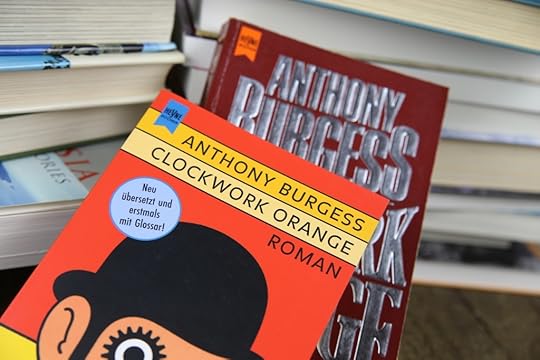 Milkbars, but no bar ditches
Milkbars, but no bar ditchesMy post on bar ditches generated a lot of response on various platforms. The consensus was that I was right to use the term, though some people suggested I should have defined it. Honestly, I didn’t think about defining the term when I used it, and even when my editor suggested people wouldn’t know what it was, I was unmoved.
When you’re introducing readers to a place they aren’t familiar with — and by that I mean the fictional world of your story — it adds a bit of mystery to throw out unusual terms. You have to do it sparingly, of course, otherwise it’s just becomes confusing.
But as a reader, you’re jumping into this world; it’s not going to stop for you. That, by the way, is how the real word works too. Move to a new place or start a new job, and you have to learn how things are done there, or you have to pick up on the unique customers or language that helps define the place.
The first time I read Anthony Burgess’ A Clockwork Orange (the American version), I just jumped in. I “learned” Nadsat, the Russian-influenced English slang spoken by the gangs from the context. Only when I finished it did I discover that the publisher had put a helpful glossary at the end, defining all the terms.
But to this day, I’m glad I didn’t know it was there. Part of what Burgess wanted to achieve was a sense of alienation. The language barrier created a distance with the characters and may even have helped make them more palatable to readers, who typically might not have identified with youthful murders and rapists, let alone cheered for them to be able to continue murdering and raping.
Of course, The Big Empty is tamer fare. We have bar ditches, gimme caps, and the occasional bois d’arc tree, and there’s some tech jargon like telephony, but for the most part, it’s written in plain English (I hope).
I should also note that fiction differs from nonfiction in this regard. For nonfiction, it can be completely appropriate to define terms as they’re introduced. You can also use footnotes or a glossary. In fact, I added a glossary of ship terms to The Man Who Thought Like a Ship, which a number of readers said they found helpful. (That glossary was actually my father’s. I used an abridged version from his textbook Wooden Shipbuilding and the Interpretation of Shipwrecks. I was able to do that because we had the same publisher.)
I know why I made the decisions I made on the language in The Big Empty, but from a reader’s perspective, how do you feel about coming across unfamiliar terms? Is it off-putting, or does it make you feel like you’re listening into to a conversation?



